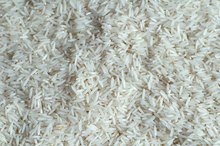What does fact checked mean?
At Healthfully, we strive to deliver objective content that is accurate and up-to-date. Our team periodically reviews articles in order to ensure content quality. The sources cited below consist of evidence from peer-reviewed journals, prominent medical organizations, academic associations, and government data.
The information contained on this site is for informational purposes only, and should not be used as a substitute for the advice of a professional health care provider. Please check with the appropriate physician regarding health questions and concerns. Although we strive to deliver accurate and up-to-date information, no guarantee to that effect is made.
Does Eating Bread Make You More Hungry?
Your body requires carbohydrates to provide energy, although certain varieties of carbohydrates may lead to an increase in hunger. All carbohydrates, except for fiber, affect your blood glucose levels. The glycemic index provides ratings that indicate how quickly certain foods affect your blood sugar. Foods with high glycemic ratings, such as bread, may make you hungrier than foods with low glycemic ratings.
Glycemic Index
Sugar, starch and fiber provide the basis for carbohydrate foods. Fiber is the only type of carbohydrate that your body can’t convert into sugar. Your body breaks down other carbohydrates at variable rates. The glycemic index ranks foods on how quickly they increase the amount of glucose in your blood stream. Evidence suggests that foods with high rankings may increase your risk of heart disease, weight gain and diabetes, according to the Harvard School of Public Health.
- Sugar, starch and fiber provide the basis for carbohydrate foods.
- The glycemic index ranks foods on how quickly they increase the amount of glucose in your blood stream.
Hunger Control
Foods Containing Glucose or Fructose
Learn More
Foods that cause a quick increase in blood glucose levels may also increase hunger. Proponents of low-carb diets believe foods that cause a quick rise in blood sugar levels lead to an increase in hunger, due to the responding rise in insulin levels. Foods with glycemic index rankings above 70 tend to create the greatest impact on your blood sugar levels 1. More research is necessary to prove the premise behind low-carb diets, including the way certain foods may affect your feelings of hunger.
- Foods that cause a quick increase in blood glucose levels may also increase hunger.
- Proponents of low-carb diets believe foods that cause a quick rise in blood sugar levels lead to an increase in hunger, due to the responding rise in insulin levels.
Bread
Your body quickly converts plain white bread into glucose, giving this food a glycemic index ranking of more than 70. Although processed foods, such as white bread, may cause an increase in hunger, whole grains tend to digest slowly, making you feel full longer. Whole grain breads contain both the bran and germ of the grain, giving them more fiber and making them digest slower.
Considerations
Simple Carbohydrates Vs. Complex Carbohydrates and Heart Rate
Learn More
Talk to your doctor before making sudden or extreme changes to your diet, especially if you have diabetes or hypoglycemia. Although white bread may increase hunger, whole grains provide healthy nutrients that help round out a balanced diet. The Harvard School of Public Health recommends adding good carbohydrates to your diet by consuming whole grain breads that list whole wheat or another whole grain as the first ingredient on the label.
Related Articles
References
- MayoClinic.com; Glycemic index diet: Losing weight with blood sugar control; November 2009
- Ojo O, Ojo OO, Adebowale F, Wang XH. The effect of dietary glycaemic index on glycaemia in patients with type 2 diabetes: A systematic review and meta-analysis of randomized controlled trials. Nutrients. 2018;10(3):373. Published 2018 Mar 19. doi:10.3390/nu10030373
- Glycemic Index and Diabetes. American Diabetes Association
- Search for the Glycemic Index. The University of Sydney
- Zeevi D, Korem T, Zmora N, et al. Personalized Nutrition by Prediction of Glycemic Responses. Cell. 2015;163(5):1079-1094. doi:10.1016/j.cell.2015.11.001+
- Sacks FM, Carey VJ, Anderson CA, et al. Effects of high vs low glycemic index of dietary carbohydrate on cardiovascular disease risk factors and insulin sensitivity: the OmniCarb randomized clinical trial. JAMA. 2014;312(23):2531-41. doi:10.1001/jama.2014.16658.
- Vega-lópez S, Venn BJ, Slavin JL. Relevance of the Glycemic Index and Glycemic Load for Body Weight, Diabetes, and Cardiovascular Disease. Nutrients. 2018;10(10). doi:10.3390/nu10101361
- Glycemic Index Database. University of Sydney. Updated October 13, 2020
- Eleazu C. O. (2016). The concept of low glycemic index and glycemic load foods as panacea for type 2 diabetes mellitus; prospects, challenges and solutions. African health sciences, 16(2), 468–479. doi:10.4314/ahs.v16i2.15
- Foster-Powell, Kaye, Holt, Susanna and Brand-Miller, Janette. "International table of glycemic index and glycemic load values: 2002." American Journal of Clinical Nutrition. 76,:1: 5-56 (2002).
- International Carbohydrate Quality Consortium, Jenkins, D. J., Willett, W. C., Astrup, A., Augustin, L. S., Baer-Sinnott, S., … Wolever, T. M. (2014). Glycaemic index: did Health Canada get it wrong? Position from the International Carbohydrate Quality Consortium (ICQC). The British journal of nutrition, 111(2), 380–382. doi:10.1017/S0007114513003905
- Leroux, MarcusFoster-Powell, Kaye, Holt, Susanna and Brand-Miller, Janette. "International Table of Glycemic Index and Glycemic Load Values: 2002." American Journal of Clinical Nutrition. Vol. 76, No. 1, 5-56, (2002).
- Lui, S., Willett, WC, et al. "A prospective study of dietary glycemic load, carbohydrate intake, and risk of coronary heart disease in US women.." American Journal of Clinical Nutrition. 71(6):1455-61. (2001).
- Mayer-Davis, E.J., Dhawan, A et al. "Towards understanding of glycaemic index and glycaemic load in habitual diet: associations with measures of glycaemia in the Insulin Resistance Atherosclerosis Study.." British Nutrition Journal. 95(2):397-405. (2006).
- Sacks, F. M., Carey, V. J., Anderson, C. A., Miller, E. R., 3rd, Copeland, T., Charleston, J., … Appel, L. J. (2014). Effects of high vs low glycemic index of dietary carbohydrate on cardiovascular disease risk factors and insulin sensitivity: the OmniCarb randomized clinical trial. JAMA, 312(23), 2531–2541. doi:10.1001/jama.2014.16658
- Salmeron, J, Manson, JE, et al. "Dietary fiber, glycemic load, and risk of non-insulin-dependent diabetes mellitus in women.." Journal of the American Medical Association. 12;277(6):472-7. (1997).
- Vega-López, S., Venn, B., & Slavin, J. (2018). Relevance of the Glycemic Index and Glycemic Load for Body Weight, Diabetes, and Cardiovascular Disease. Nutrients, 10(10), 1361. doi:10.3390/nu10101361
- Zeevi, D. Korem N. et al. Personalized Nutrition by Prediction of Glycemic ResponsesCell. 163:(5):1079-94. November 2015.
Writer Bio
Laura Wallace Henderson, a professional freelance writer, began writing in 1989. Her articles appear online at Biz Mojo, Walden University and various other websites. She has served as the co-editor for "Kansas Women: Focus on Health." She continues to empower and encourage women everywhere by promoting health, career growth and business management skills.








